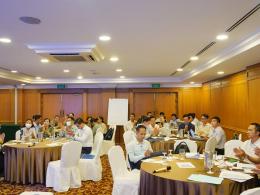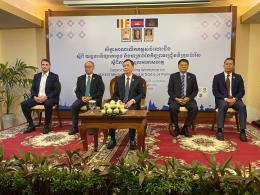Siem Reap: The Department of Climate Change (DCC) of the General Secretariat of the National Council for Sustainable Development (GSSD), with the support of Cambodia Climate Change Alliance (CCCA), organized a Knowledge Sharing Event of the Cambodia Climate Change Alliance – Phase 3 (CCCA3) on Monday-Tuesday, December 6-7, 2021 at Angkor Paradise Hotel. The event aimed at capturing best practices from all efforts carried out at the national and sub-national levels by different actors who have been working with the CCCA3. The event was chaired by H.E. Tin Ponlok, 2nd Deputy Chairman of the National, with the participation of H.E. Dr. Vann Monyneath, Secretary General of the GSSD, H.E. Chea Chanthou, Deputy Secretary General of the GSSD, Dr. Hak Mao, Director of the DCC, representatives from line ministries/NCSD members, members of CCTWG, development partners, academia and representatives from CCCA3 project, a total of 78 participants.
In his opening remarks, H.E. Tin Ponlok stated that after almost two years with restrictions on meetings and travelling in order to prevent further spread of the COVID-19 pandemic, it is great that it was possible to organize this event and people to meet in person thanks to the effective leadership of government in the management of the COVID-19 pandemic and providing of the COVID-19 vaccination for all Cambodian people. Climate action has become more critical in the international, local, and Cambodian contexts. Both the government and the private sector understand the economic and social risks of the changing climate; meanwhile, the investments to strengthen the economy and greenhouse gas emissions reductions have been proliferated. The CCCA3 grant projects acknowledge that the climate is changing and develop suitable approaches and technologies for the Cambodian context that are responding to the priorities highlighted in the updated NDC and other strategic plans for the response. After that, he highlighted the importance of the private sector engagement, for example, in the implementation of the renewable energy (Renewable 100) and the Carbon Border Adjustment Mechanism (CBAM) towards low carbon emissions society. He also mentioned that Samdech Akka Moha Sena Padei Techo Hun Sen, Prime Minister of Cambodia, had highlighted at the 13th ASEM meeting, which Cambodia recently hosted the need to "promote green development and low carbon emissions". He also told that during the COP26 meeting in Glasgow, the United Kingdom, Cambodia had stressed out that the country will not develop any new coal power plants nor construct new hydropower dams along the Mekong. He also requested the CCCA team to evaluate the outcome and impact of the projects implementation over the past decade concerning climate change policies, strategic plans, and activities, not just the output level.
H.E. Tin Ponlok encouraged all participants to share their view on project progresses and challenges that enable the CCCA3 and the DCC staff to support the project implementations better. He finally thanked the development partners, including the European Union (EU), the United Nations Development Program (UNDP), and the government of Sweden, for their strong support to the CCCA programme for more than a decade, showing fruitful results in the response to climate change in Cambodia.
At the end of the workshop, H.E. Dr. Van Monineath thanked the participants and development partners for their active participation in the event, and providing an opportunity for government institutions, academia and NGOs with their CCCA granted projects to meet and share ideas regarding the project progresses made towards institutional capacity enhancement, and response to climate change. He also noted that all challenges, feedback, and best practices of each project teams are crucial inputs in order to strengthen the implementation guidelines and succeed with the project implementation. He also mentioned the royal government's commitments at the COP26 meeting, already also highlighted by H.E. Tin Ponlok. He sees that appropriate new options are needed to ensure energy supply for the people and the socio-economic development.
The event was successfully conducted and featured by a range of exciting activities such as poster presentations capturing the best practices and progresses made in implementation of the 21 CCCA3 granted projects related to climate change adaption and mitigation (innovation grant round 1&2, research partnership, and line ministries grant). There were also group discussions and presentations based on thematic topics and a study tour to Teuk Saat 1001, one of the CCCA3-funded projects, to share experiences on project management and related challenges to enhance institutional capacity, human resource development, and to create opportunities for future collaboration and actions to response to climate change.
Photo album: https://ncsd.moe.gov.kh/node/12760




















